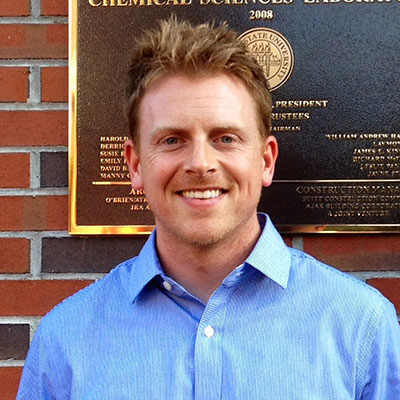
Florida State University scientists have been awarded a $1.43 million grant to support their work using synthetic chemistry to push the boundaries of biomedical research.
The funds, awarded by the National Institutes of Health, will aid researchers as they explore the potential of fully synthetic natural products to tweak critical interactions between protein molecules — a common bimolecular process that, if gone awry, can contribute to the development of diseases like Alzheimer’s and cancer.
“I’m excited. This grant will allow us to carry out research that we wouldn’t otherwise be able to do,” said Assistant Professor of Chemistry James Frederich. “This is impactful science — the idea of taking a structure provided by nature and redesigning it in presumably any way you want in order to elicit a desired biological outcome. I think that demonstrates the power of synthetic organic chemistry.”
Many proteins in the body rely on physical contacts with other proteins in order to function properly. Signaling pathways within a cell — which are crucial to cellular communication and survival — are often governed by networked chains of interacting proteins.
When properly calibrated, these protein-protein interactions work to coordinate most molecular processes in the body. However, aberrant or destabilized pathways can have dangerous results.
“Misregulation of protein-protein interactions often contributes to disease pathology,” Frederich said. “Finding a means to modulate these interactions using small molecules can be directly relevant to disease outcomes. The challenge is to selectively target particular protein-protein contacts, and that’s where the work we’re doing comes in.”
With the support of the NIH funds, Frederich and his team will synthesize fusicoccanes, a family of natural products produced by fungi, and chemically refine those compounds into tools that can be selectively deployed to modulate protein-protein interactions. Specifically, the team will target interactions involving 14-3-3 proteins, a ubiquitous group of adapter proteins that chaperone several important cell-signaling pathways.
The ability to carefully target these proteins, Frederich said, may yield new strategies for combating life-threatening diseases.
“I think we have an entry point now to use these synthesized natural products in a very specific way — to turn on and off the signaling pathways that are relevant to specific diseases,” Frederich said. “While we’re a ways off now, the long-term idea is to transform these structures into medicine for human disease.”
Frederich’s research group has already made significant strides in developing the underlying synthetic organic chemistry for this project. He said this most recent grant is illustrative of FSU’s broadening research horizons.
“I think this award highlights the emerging role of FSU’s organic chemistry program in biomedical research,” Frederich said. “This helps signal a shift toward biomedical research at the chemical science level, and I think that’s an exciting development for our university and our department.”



